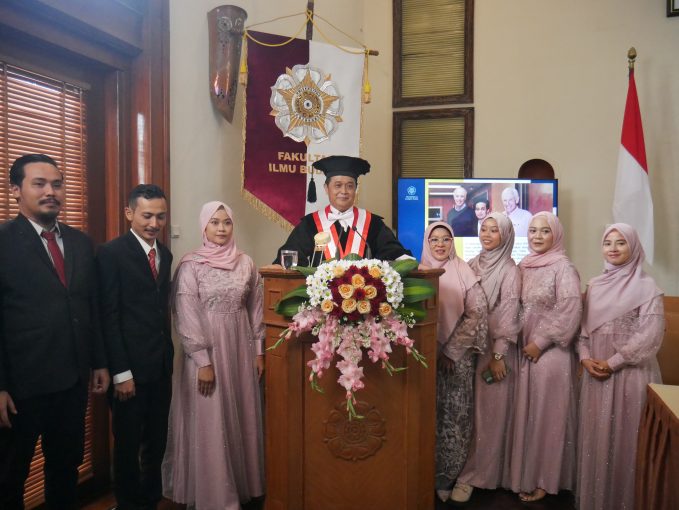
Throughout history, the Arab world has been a subject of fascination due to its unique blend of contrasting elements. The Arab identity has always been marked by a struggle between unity and fragmentation, tradition and modernity, and religious and secular values. The Arabs are often seen as the East that is trying to catch up with the West, which is considered the epitome of progress and prosperity, especially in the fields of culture and literature.
Recently, Professor Dr. Fadlil Munawwar Manshur was inaugurated as Professor of Arabic Culture at the Faculty of Cultural Sciences, Universitas Gadjah Mada. In his inaugural speech, he discussed the Arab nation and its cultural and literary heritage, which has gone through many transformations over time. He talked about the connection between Arabic and Western cultures from the perspective of symbolic interactionism.
During his speech, he presented five conclusions regarding the contiguity of Arab culture with Western culture. First, the Arab intellectuals reached their peak of glory due to the brain drain movement, which saw many Arab scientists and writers studying and perfecting Western scientific theories. Secondly, the symbol of bees and honey represents the power of cultural and scientific energy in the revival of Arab culture.
Thirdly, Christian scholars played a vital role in preserving the ancient Greek heritage, which included extensive transmission from Greek to Syriac literature and transmission from Syriac to Arabic literature. In social intercourse between Arab-Islam and Christianity, there was a great harmony and warmth. Fourth, the symbols of the sword and pen represent Arab heroism and intellectualism, where the sword symbolizes strength and power, and the pen symbolizes kindness, peace, and love of knowledge.
Finally, Fadlil discussed how modern Arab society is depicted in four novels that symbolize the power of ideology, immigration, superiorism, and agilism in Arab culture. He explained that cultural contiguity with other cultures needs to be strengthened by the concepts of structure, function, communication, and relations. In terms of praxis, he emphasized that cultural contiguity theory should provide a blueprint for concrete, applicable, and specific methods to integrate human work into its socio-cultural context.
In conclusion, Fadlil’s speech highlighted the need to strengthen the relationship between Arab and Western cultures, which can help us better understand the complex and diverse Arab world.

